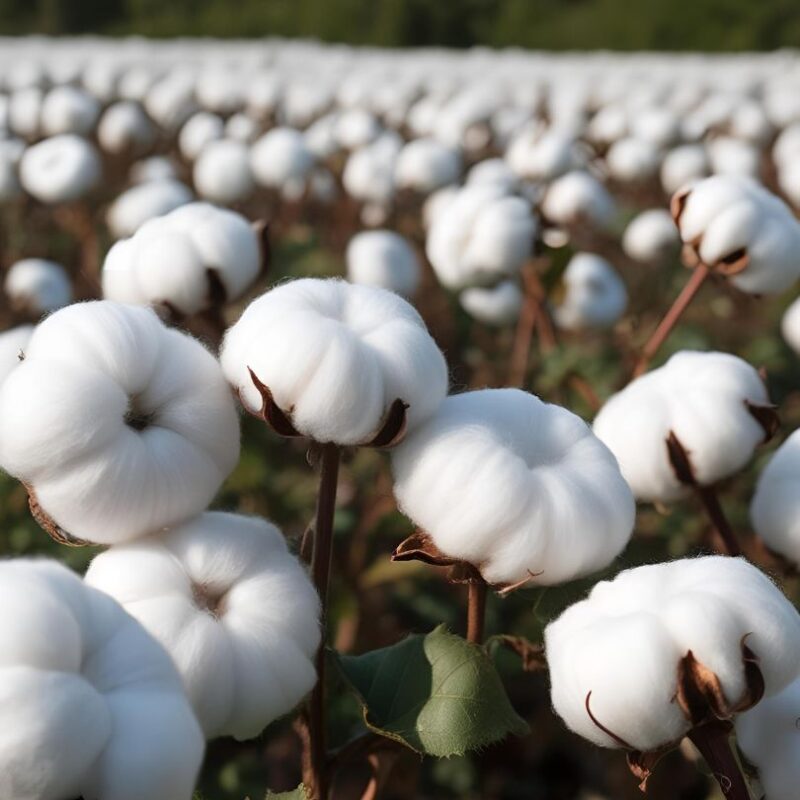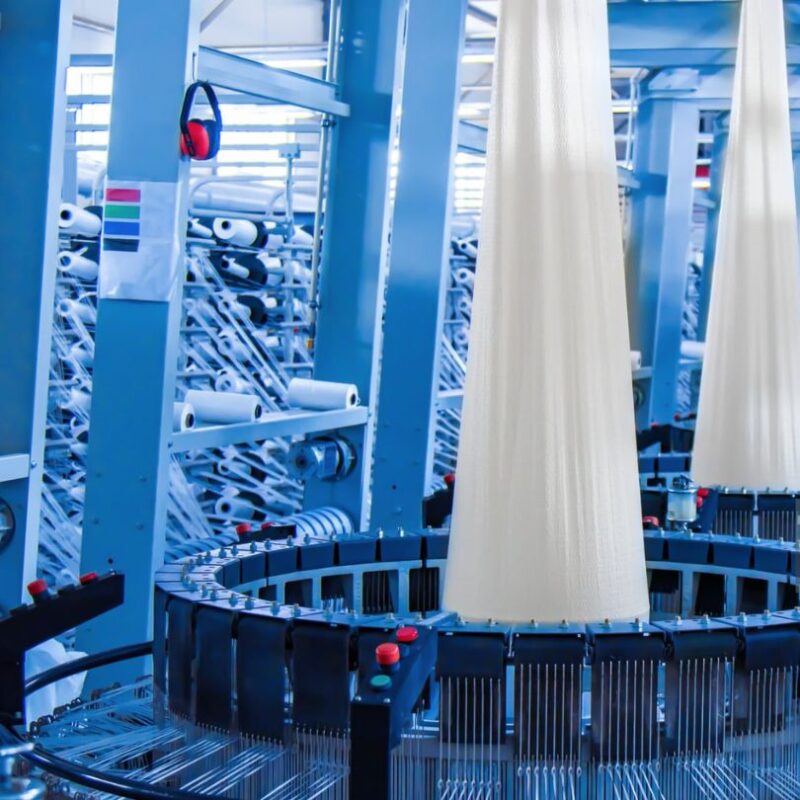Your basket is currently empty!
Organic Cotton vs Recycled Polyester: Which Is More Sustainable?
Sustainability and eco-responsibility are not just buzz words. They have been ever-present over the last decade and continue to shape the future of fashion and workwear. Sustainability is becoming an expectation from customers, so businesses should not treat their contribution to responsible practice as optional. Kitting your team out in eco-conscious workwear reinforces a motivation for environmental responsibility among your team and aligns your work culture with current trends.
With more and more customers choosing organic or recycled products, the debate between organic cotton and recycled polyester is now more relevant than ever. Both fabrics offer eco-conscious alternatives to conventional materials, but which one is the better choice for the planet?
In this blog, we’ll explore the differences, pros and cons, and ultimately answer the question: Which is more sustainable – organic cotton or recycled polyester?
What Is Organic Cotton?
Organic refers to the fibres being grown without the use of harmful pesticides, synthetic fertilisers, or genetically modified seeds, unlike conventional cotton. It is cultivated using sustainable farming methods that promote soil health and biodiversity. By eliminating toxic pesticides, organic fields are safer for wildlife and insects, which boosts the ecosystem overall and enhances soil fertility. In the long term, this leads to greater agricultural resilience, which is increasingly important where there is climate instability.
✅ Pros of Organic Cotton:
- Natural and biodegradable: Unlike synthetic fibres, these natural fibres break down naturally.
- Reduced water pollution: Organic farming uses fewer harmful chemicals than traditional cotton farming, reducing runoff into rivers and lakes.
- Skin-friendly: A soft, breathable fibre that’s gentle on sensitive skin.
- Supports ethical farming: Often grown by small-scale farmers under fair trade conditions.
❌ Cons of Organic Cotton:
- Water usage: Although better than conventional cotton, organic still requires significant irrigation.
- Energy-intensive processing: Some stages of processing still rely on fossil fuels.
- Lower yields: Organic farming generally produces less cotton per acre, meaning more land is needed. This reduces the appeal of producing cotton in this way.
- Demand could exceed supply: Before cotton can be certified as organic, the field must go through a transition period. The process of converting a cotton field into a 100% organic one takes around 3 years.
What Is Recycled Polyester?
Recycled polyester (rPET) is made by melting down post-consumer plastic (usually PET bottles), extruding it into fine filaments and re-spinning this into fibre. This fibre is then used to manufacture clothing. This closed-loop process gives new life to plastic that would otherwise end up in the ocean or landfill. Manufacturing from existing plastic helps reduce plastic pollution and also reduces the demand for virgin polyester (derived from fossil fuels). Further, producing rPET typically uses less energy (up to 50% less!) and is less damaging to the environment than virgin polyester.
Polyester is an ideal choice for clothing that needs to be durable and hard-wearing. It can be blended with other fibres like organic cotton or TENCEL to improve a garments hand-feel and breathability.
✅ Pros of Recycled Polyester:
- Diverts plastic waste: Reduces the number of bottles and plastic packaging that ends up in landfills and oceans. With consumption constantly rising, this is becoming an increasingly prevalent issue to address.
- Lower carbon footprint: Uses less energy than producing new polyester.
- Durable and quick-drying: Excellent for performance wear and uniforms which go through more wash cycles than normal clothing and are usually put under more stress testing.
- Scalable: Can be produced at industrial scale without agricultural land use.
❌ Cons of Recycled Polyester:
- Microplastic pollution: Still sheds microfibres when washed, which can enter waterways. Microfibre filters can help with this, but have not been widely adopted.
- Not biodegradable: Remains in the environment for hundreds of years if not properly recycled. If incinerated, toxic fumes contribute to air pollution
- Dependent on plastic waste: While it reuses existing materials, it doesn’t reduce the demand for single-use plastics overall.
Key Differences Between Organic Cotton and Recycled Polyester
| Feature | Organic Cotton | Recycled Polyester |
| Source Material | Natural (cotton plants) | Synthetic (recycled plastic) |
| Biodegradability | Yes | No |
| Water Use | Moderate to high | Very low |
| Energy Use | Moderate to high (farming + processing) | Low (compared to virgin polyester) |
| Carbon Emissions | Lower than conventional cotton | Lower than virgin polyester |
| Durability | Softer, less durable over time | Strong, ideal for long-lasting items |
| Comfort | Highly breathable | Moisture-wicking, less breathable |
Why Recycled Polyester Is Better Than Organic Cotton for Workwear Customers
When it comes to workwear, recycled polyester offers several clear advantages and triumphs — particularly in terms of performance, durability, and practicality in demanding environments. Workwear must be able to hold up against multiple washes without looking misshaped, worn and old. Polyester is a fibre which retains its strength and integrity, so is ideal for keeping the whole team looking fresh and professional.
What’s more, the way polyester fibres are dyed (spun-dyed) means the colour will not wash out. This gives brands the confidence to purchase staff uniforms which will look consistent among wearers and guarantees to reflect the intended brand identity throughout the life of the garment.
1. Superior Durability
Workwear needs to withstand daily wear and tear, frequent washing, and physically demanding tasks. Recycled polyester:
- Is stronger and more abrasion-resistant than organic cotton.
- Retains its shape and colour better over time.
- Doesn’t shrink, fade, or pill as easily as cotton garments.
2. Moisture Management
Unlike cotton, which absorbs moisture and takes time to dry, recycled polyester:
- Is moisture-wicking and quick-drying.
- Keeps the wearer feeling cool, dry, and comfortable, especially in physically active or outdoor roles.
- Reduces the risk of chafing and discomfort from sweat-soaked garments.
3. Lightweight and Layer-Friendly
Recycled polyester offers a lighter weight compared to cotton, making it ideal for:
- Layering under jackets or high-visibility vests.
- Uniforms that require flexibility and freedom of movement.
- Year-round use, including warmer seasons.
4. Easy Care and Maintenance
Workwear made from recycled polyester is:
- Low maintenance – easy to machine wash and fast to dry.
- Less prone to wrinkles, saving time on ironing and ensuring your team looks professional
- More resilient to staining, especially when treated with additional coatings or finishes. This keeps your team looking fresh and reduces the frequency of uniform replacements
5. Sustainability Through Longevity
While organic cotton is biodegradable, the longer lifespan of recycled polyester reduces the need for frequent replacement. That means:
- Fewer garments are produced and discarded over time.
- The carbon footprint per wear is significantly lower.
- It supports a circular economy, especially when garments are recycled again at the end of life.
The Verdict: Best for Workwear?
If your priority is natural, biodegradable fabric, organic cotton may still be your go-to. This is a more prevalent choice for promotional wear, which is usually only worn a handful of times. However, for most workwear applications where durability, performance, and longevity matter, recycled polyester is the smarter choice.
It offers:
- A more resilient and versatile fabric.
- Maintains a crisp, fresh look even after many washes
- Better performance in industrial, outdoor, and active roles.
- A lower overall environmental impact when you factor in garment lifespan and resource efficiency.
Final Thoughts
Choosing between organic cotton and recycled polyester doesn’t have to be a competition — both play an important role in the shift toward sustainable fashion and workwear. Both garments have their merits in replacing conventional methods with more sustainable practices. But when it comes to high-performance, long-lasting, and eco-conscious uniforms, recycled polyester stands out as the ideal solution for many businesses.
At Essential Workwear, we offer a wide range of sustainable garments crafted from recycled polyester and other eco-friendly materials — helping businesses look professional, perform better, and reduce their environmental impact. Check out Regatta Honestly Made, a line manufactured with 100% recycled polyester. This initiative stems from one of our best-selling brands, Regatta Professional. Their products and processes are inspired by the great outdoors and are suitable for most industries.























